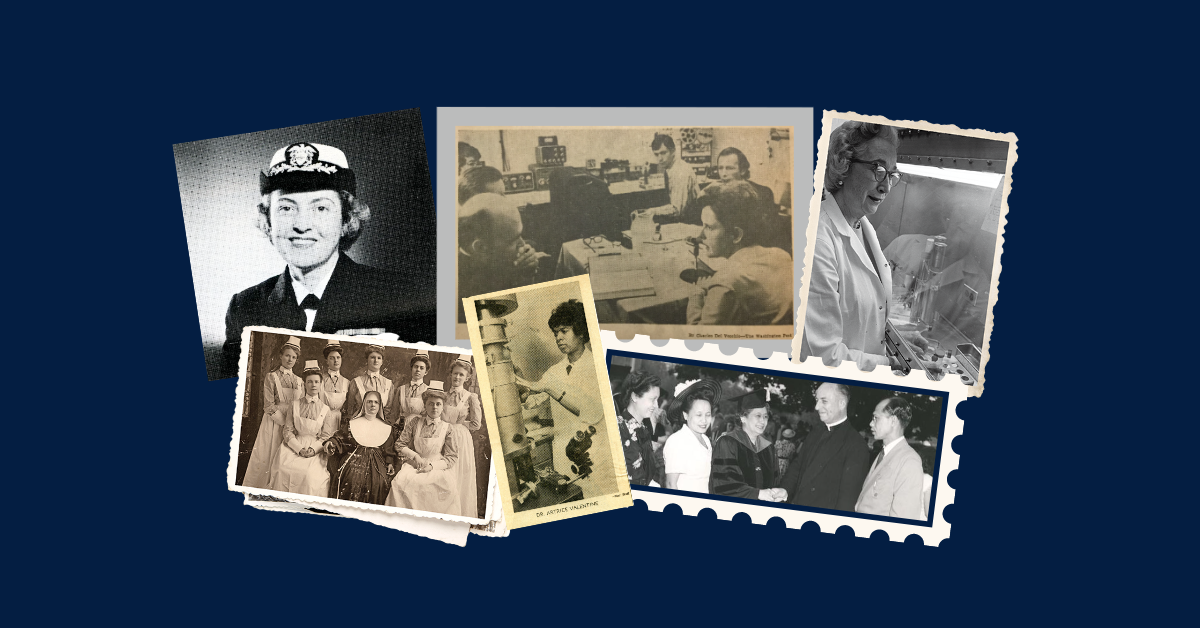Celebrating Eight Decades of Women Trailblazers Who Made History in the Graduate School
Eighty years ago this year, the Graduate School of Arts & Sciences began formally admitting women. But women were earning their graduate degrees far before this milestone year in 1943.
In celebration of Women’s History Month, discover stories from women trailblazers and changemakers: from an international student who became a noted civic leader in the Philippines to the first person to earn a Ph.D. in biology at Georgetown and a prominent astrophysicist who discovered dark matter. These are just a few of the women who found their calling in the Graduate School throughout Georgetown’s history and paved the way for future generations of Hoyas.
The First Women Students at Georgetown
The Graduate School was founded in 1820, three decades after university founder John Carroll established Georgetown College in 1789.
In 1880, Annie E. Rice and Jeannette J. Sumner were some of the first women who enrolled at Georgetown, before women began taking graduate courses, studying in what was then known as the Medical Department. Rice and Sumner stayed for one year before transferring to the Women’s Medical College in Philadelphia, where they earned their medical degrees two years later. They both returned to DC after graduating to establish the Women’s Dispensary, an organization that offered health and medical services for women and children.
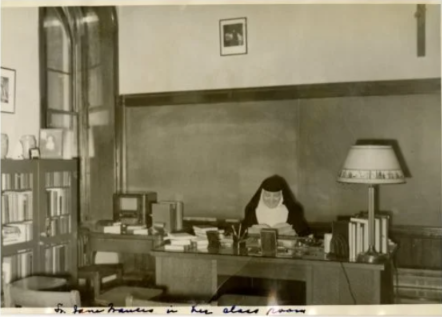
Less than two decades later, the first cohort of women enrolled in the newly formed Georgetown University Hospital Training School for Nurses received their post-high school diplomas in 1906. Of the eight graduates, two were sisters from the Order of Saint Francis. Their enrollment helped pave the way for women to eventually attend other schools at Georgetown, and, long-term, it led to the creation of the School of Nursing & Health Studies – which just recently divided into two new schools in 2022.
Sr. Jane Frances Liebell, another sister from the Order of the Visitation of Holy Mary who taught at Georgetown Visitation School, became the first person to submit her dissertation in history in 1922. She received her doctorate degree a year later. While Sr. Liebell was not formally enrolled at Georgetown, male faculty members traveled to teach her and facilitated her educational journey.
“An Incomparable Endowment”: The First Women Formally Admitted
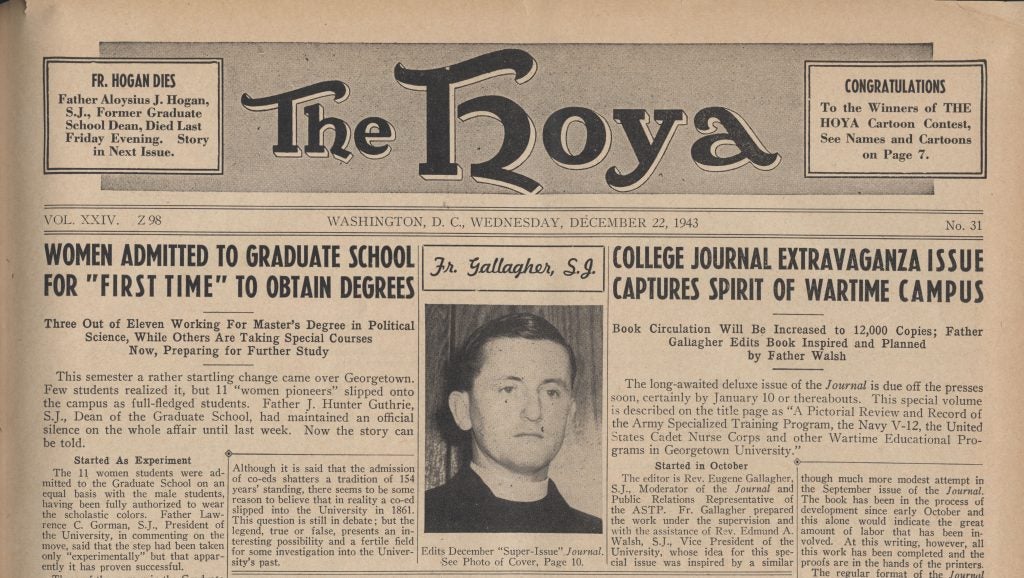
Despite the fact that women had received postgraduate and graduate degrees 21 years prior, it wasn’t until 1943 that the university formally admitted women to graduate study.
In a Washington Post article, the 11 “women pioneers” were touted as only being admitted experimentally during World War II as a result of fewer male students enrolling. Eight of the women were teachers at the nearby Georgetown Visitation Convent who attended classes in philosophy and “other special classes” at the Graduate School. The other three students were working toward a master’s in political science, including an international student from Canada.
One of these students, Ensign Rita Lenihan (G’45), had been serving on duty in WAVES (Women Accepted for Volunteer Emergency Service), a division of the U.S. Navy created during World War II, before enrolling at Georgetown. After graduation, she was eventually promoted to captain and served as the director of the women’s branch of the U.S. Naval Reserve.
“Georgetown gave me the opportunity to support my conviction that he who concerns himself with the pursuit of knowledge is the recipient of an incomparable endowment.”
– Captain Rita Lenihan
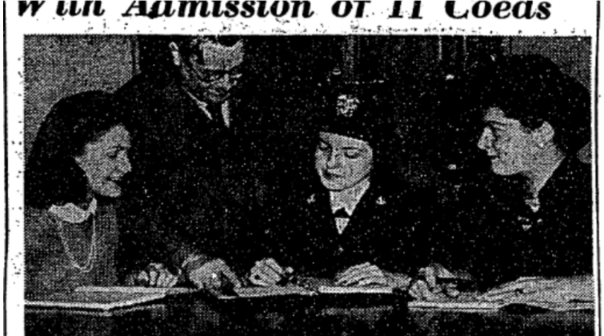
“Of how many things in life can it be said, ‘It means as much to me today as it did then?’ This I can say about the Graduate School of Georgetown University’s School of Foreign Service,” she said in a 1966 article. “Georgetown gave me the opportunity to support my conviction that he who concerns himself with the pursuit of knowledge is the recipient of an incomparable endowment. For me, education is a way of life rather than a means to an end or something that must have a practical application.”
Captain Lenihan continued her career in the Navy and eventually received the Legion of Merit award. In 1972, she was one of the first women named to serve on Georgetown’s Board of Regents.
A Legacy of Trailblazing Students
After the doors were opened for women to regularly attend the Graduate School at Georgetown, their legacy of excellence continued through the decades.
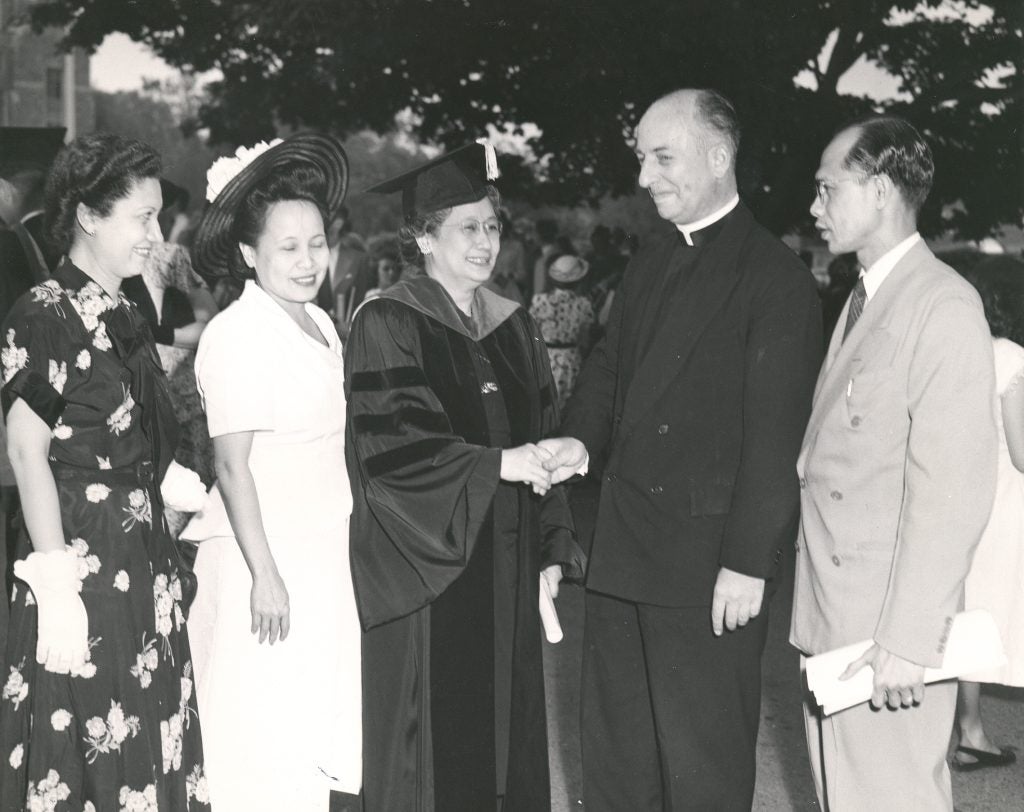
Concepcion Aguila (G’48), was the first woman and international student to receive a Ph.D. in political science. Born in the Philippines, Aguila served as a kindergarten teacher before earning a Bachelor of Laws degree in 1924 from the Philippine Law School; she passed the bar the same year, and then obtained her master of laws from Centro Escolar University (CEU). Upon graduation from Georgetown, she returned to CEU and rose in the ranks from a classroom teacher to dean of the graduate school there.
In the early to mid-50s, Aguila became more active in civic duties and served as president of the United Nations Association of the Philippines. Writing articles on policy and democracy, Aguila also authored a book, Educational Legislation, published in 1956. She passed away from cancer in 1956, and posthumously had a street in the city of Manila named in her honor.
In the 1950s, another shining star started her career at Georgetown: Vera Rubin (G’54) received her doctorate in astronomy and went on to become one of the most important American astrophysicists of the 20th century. Not only did she complete her studies during the tenure of Francis J. Heyden, whom Georgetown’s Heyden Observatory is named after, but she also raised three children while earning her degree.
In the late 1970s, Rubin pioneered the study of galaxy rotation rates that provided definitive evidence for the existence of dark matter. She continued to advocate for women in science until her passing in 2016, and a few years ago, Rubin had a national observatory named in her honor.
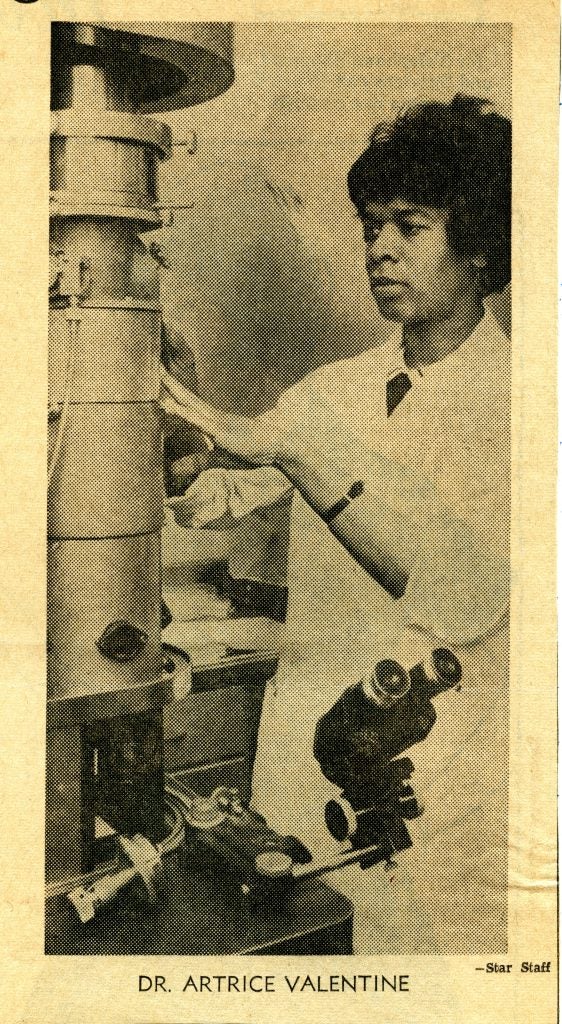
Artrice Valentine (G’66) was the first person to receive a Ph.D. in biology from Georgetown’s then three-year-old biology department. She studied morphology of viruses and their relationship to cells and was trained in using the electron microscope. In an article published by Star at the time of her graduation, Valentine said, “Electron microscopy is a magnificent field to be in… I get infuriated when people think of it as just a laboratory tool… I look at a cell and see beauty in it.”
Prior to Georgetown, Valentine worked at the National Institutes of Health (NIH) in both the Heart and Cancer Institutes and earned her master’s in biology at George Washington University. Her postdoctoral career focused on research and administration within the NIH.

Early in the 1980s, Elizabeth Velez (G’83) came to Georgetown for her master’s in English. Originally from Alabama, she was active in the civil rights and anti-war movements around Vietnam in the 60s and 70s. Velez studied theories of teaching writing with Professor Jim Slevin, who was director of the writing program at the time.
“Professor Slevin saw writing as a liberatory practice, so issues of social justice were often highlighted within the classroom.” She said this allowed her academic interests to flourish while on campus. “Georgetown’s commitment to social justice inspired me throughout my teaching career – and still does.”
In the years after she graduated, Velez decided to dedicate her passion for social justice to a program at Georgetown for first-generation college students. In 1991, she began serving as the academic director of the Community Scholars Program, which provides support, resources, programming, academic advising and mentoring for students throughout their college careers. Velez helped to grow the program from 30 students to nearly 80 every year as of 2022.
She now serves as a lecturer in the Women’s Studies program, has co-authored four books of poetry about love and aging, and launched a website inspired by a course she’s taught of the same name, Reading Motherhood. She also teaches writing at Patuxent Prison through Georgetown’s Prison and Justice Initiative.
Celebrating 80+ Years of Women in Graduate Education
As the Graduate School celebrates Women’s History Month and this 80th anniversary, Maria Cancian, dean of the McCourt School of Public Policy, says it’s important to celebrate the accomplishments of these women trailblazers, as well as those who continue to impact Georgetown today.
“Their accomplishments, and those of the many women who have followed, demonstrate that the long-term investment in a more inclusive approach to higher education has great returns, both locally and globally.”
— Maria Cancian

“The women who broke the 150+ years barrier of male-only education at Georgetown were important leaders and changemakers,” says Cancian. “Their accomplishments, and those of the many women who have followed, demonstrate that the long-term investment in a more inclusive approach to higher education has great returns, both locally and globally.”
Nadia Sarfraz (G’24), current GradGov president and doctoral student in chemistry, says that Women’s History Month is a time to reflect on how far women have come and how far we still have yet to go.
“It is a time for us to remember our sisters who are fighting for basic human dignity and rights every day – to think about women’s perseverance and their crucial role in science, policy, economics and society,” she said.
The extraordinary women pioneers in the Graduate School’s history, whose research, service and teaching have shaped and defined our global community and university, have transformed history for future generations to come.
